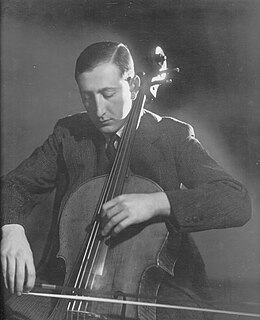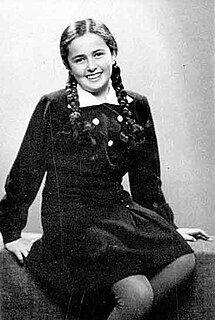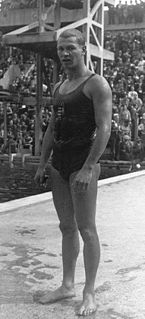 W
WOtti Berger was a textile artist and weaver. She was a student and later teacher at the Bauhaus.
 W
WJózsef Braun was a Hungarian Olympic footballer who played as a half back. Braun began his career in Hungary before finishing it in the American Soccer League. He earned 27 caps, scoring 11 goals, with the Hungarian national team. After retiring from playing, he coached for several years. Braun was killed in 1943 in a Nazi forced labor camp.
 W
WImre Bródy was a Hungarian physicist who invented in 1930 the krypton-filled fluorescent lamps , with fellow-Hungarian inventors Emil Theisz, Ferenc Kőrösy and Tivadar Millner. He developed the technology of the production of krypton bulbs together with Michael Polanyi. He was the nephew of writer Sándor Bródy.
 W
WSándor Bródy was a Jewish-Hungarian football (soccer) player. He competed for Hungary at the 1912 Olympics and was a star in the national side. His first appearance in Ferencvaros was in 1902 and he played in the starting lineup until 1914.
 W
WDr. Oszkár Gerde was a Hungarian sabre fencer who won team gold medals at the 1908 and 1912 Olympics. After finishing his active career he judged international fencing competitions and worked as a lawyer. Being a Jew, he was deported from Hungary in 1944, and killed in the same year at the Mauthausen-Gusen Concentration Camp in Austria. In 1989 he was inducted into the International Jewish Sports Hall of Fame.
 W
WGisella Grosz, originally Gizella Grosz was a Hungarian classical pianist.
 W
WErnő Grünbaum was a Transylvanian-Hungarian painter, graphic artist, lithographer and illustrator. He worked in a variety of styles, including Art Nouveau, Expressionism and Cubism.
 W
WPaul Hermann, also known as Pál Hermann, was a virtuoso cellist and composer.
 W
WEva Heyman was a Jewish girl from Oradea. She began keeping a diary in 1944 during the German occupation of Hungary. Published under the name The Diary of Eva Heyman, her diary has been compared to The Diary of Anne Frank. She discusses the extreme deterioration of the circumstances the Jewish community faced in the city, offering a detailed account of the increasingly restrictive anti-Jewish laws, the psychological anguish and despair, the loss of their rights and liberties and the confiscation of property they endured. Heyman was 13 years old when she and her grandparents perished in the Holocaust.
 W
WImre Kinszki (1901–1945) was a Jewish-Hungarian photographer.
 W
WLipót, or Leopold, Klug was a Jewish-Hungarian mathematician, professor in the Franz Joseph University of Kolozsvár.
 W
WMaria Leitner was a Hungarian writer and journalist in the German language. She is remembered as a pioneer of "undercover reporting".
 W
WImmanuel Löw was a Hungarian rabbi, scholar and politician.
 W
WImre Mándi was a Hungarian boxer who competed in the 1936 Summer Olympics. He was eliminated in the quarterfinals of the welterweight class after losing his fight to the upcoming gold medalist Sten Suvio. Next year he won a silver medal at the European championships.
 W
WEugénia Miskolczy Meller was one of the most active feminists and women's rights activists in Hungary from the turn of the century to the interwar period. One of the founding members of the Feminist Association, she served as a leader for many of the organizations committees and events, arguing for gender equality, as well as women's suffrage. A pacifist, Meller worked with the Women's International League for Peace and Freedom (WILPF) arguing for disarmament and urging the passage of international laws codifying citizenship regulations to protect women. Though she had converted to Lutheranism, she was arrested when the Nazis invaded Hungary in 1944 and disappeared. In 1946, she was posthumously honored for her humanitarian works.
 W
WKároly Pap was a Hungarian writer.
 W
WAttila Petschauer was a Hungarian Olympic champion fencer of Jewish heritage.
 W
WMiklós Radnóti was a Hungarian poet and teacher.
 W
WJenő Rejtő was a Hungarian journalist, pulp fiction writer and playwright who died as a forced labourer during World War II. He was born in Budapest, Austria-Hungary, on 29 March 1905, and died in Evdakovo, Voronezh Oblast, Soviet Union on 1 January 1943. Despite the "pulp" nature of his writings, he is not only widely read in Hungary, but is also much appreciated by literary critics. It is a prevalent opinion that he lifted the genre to the level of serious art, and his works will long outlive him.
 W
WGyörgy Sárközi (1899–1945) was a Hungarian poet, translator and writer, and collaborator to the magazine Nyugat, Pandora (1927), Válasz (1935–1938) and Kélet Népe (1939). As he was Jewish, in 1944 he was deported to the work camp of Balf and died there.
 W
WShimon Sofer was the Rav of the Hungarian city of Eger (Erlau) and the progenitor of the Erlauer Hasidic dynasty. His grandson, Rabbi Yochanan Sofer, was the Erlauer Rebbe in Israel.
 W
WAndrás Székely was a Hungarian swimmer who won a bronze medal in the 4 × 200 m freestyle relay at the 1932 Summer Olympics. He won a European title in this event in 1931.
 W
WDezső Szomory was a Hungarian Jewish writer and dramatist. In his history plays and other works, he developed a unique tone and style of Budapest Hungarian; his work has been compared to that of Marcel Proust. He died during the Holocaust while living under Swedish protection in Budapest, suffering "starvation, loneliness, and depression".
 W
WAlfred Tauber was a Hungarian-born Austrian mathematician, known for his contribution to mathematical analysis and to the theory of functions of a complex variable: he is the eponym of an important class of theorems with applications ranging from mathematical and harmonic analysis to number theory. He was murdered in the Theresienstadt concentration camp.
 W
WYekusiel Yehuda Teitelbaum was Chief Rabbi of Sighet/Máramarossziget from 1936–1940 (Romania), 1940–1944 (Hungary).
 W
WErnő Tibor, originally Fischer was a Hungarian Impressionist and Neo-Impressionist painter of Jewish ancestry.
 W
WÁrpád Weisz was a Hungarian Olympic football player and manager. Weisz was Jewish, and was killed with his wife and children by the Nazis during the Holocaust in World War II at Auschwitz.
 W
WFerenc Weisz (1885–1944) was a Hungarian football player and manager. Weisz, who was Jewish, played club football as a striker for Ferencváros and MTK, winning the Hungarian league nine times. He also represented his country at international level, earning 17 caps between 1903 and 1917. After retiring as a player in 1920, Weisz became manager of Újpest between 1920 and 1922.
Moshe Dovid Winternitz (1855–1944) was the Head of the Beth din Rabbinical Court in Satmar, Hungary. This position was second to the Rabbi of the city. He is considered to be one of the greatest scholars of his time. People from around the globe would send him Halachic queries.